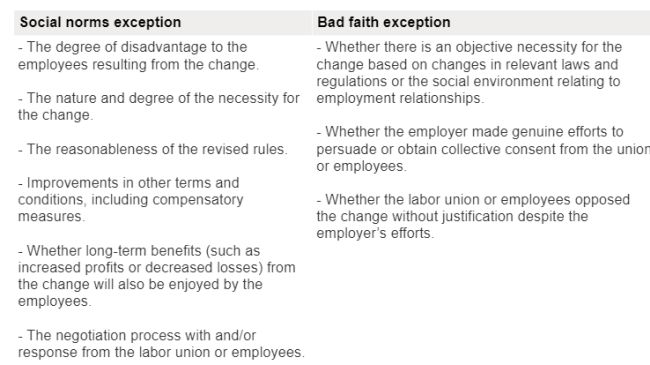- within Employment and HR topic(s)
- in United States
- with readers working within the Technology industries
- within Government, Public Sector, Antitrust/Competition Law and Wealth Management topic(s)
- with Senior Company Executives, HR and Inhouse Counsel
For many years, Korean employers have had the option to impose changes to work rules without obtaining their workers' consent, where those changes are in line with social norms. In a recent decision, the Supreme Court of the Republic of Korea abolished this exception and formulated a new test by reference to the concept of bad faith.
Supreme Court recasts workforce consent exception
Under Korean law, when an employer changes its policies and regulations that establish collective terms and conditions of employment (referred to as 'rules of employment' or simply 'work rules'):
- it must consult with a majority union or, if there is no majority union, with the workforce generally;
- if a change is adverse to the employees, it must also obtain the consent of a majority union or, if there is no majority union, a majority of the employees; and
- if workforce consent is required but not obtained, the adverse change is invalid as to all existing employees.
However, for the past 45 years the Korean courts have traditionally recognised an exception to the workforce-consent requirement: if the adverse change is 'reasonable in accordance with social norms,' workforce consent is not required (the 'social norms' exception). Although this exception has been interpreted narrowly and rarely applied, it provided a basis to argue that an adverse change imposed without seeking or obtaining workforce consent was valid. However, on 11 May, 2023, in decision, the Supreme Court of South Korea abolished this exception. Instead, the Court held that the majority-consent requirement will apply unless it is unreasonably abused by the union or workforce (the 'bad faith' exception).
Although it remains uncertain how the bad faith exception will work in practice, it appears that the primary difference between the old and the new rules could depend on whether a good faith consultation and attempt at persuasion is necessary to rely on the exception.
Under the social norms exception, consultation was one factor in the analysis. An adverse change could theoretically be valid without any employee consultation at all, if the changes were reasonable in accordance with social norms. Whereas under the bad faith exception, good faith consultation may be a firm prerequisite to rely on the exception at all, regardless of the nature of the change itself, because it only applies if the union/workforce refuses the change in bad faith and that appears to require good-faith efforts at persuasion by the employer. The factors that must be considered under the social norms exception and the bad faith exception are as follows:
The main takeaway from this decision is that it is probably a better strategy for employers to try to persuade the workforce about the proposed changes, rather than rely on 'bad faith'.
The main takeaway from this decision is that it is probably a better strategy for employers to try to persuade the workforce about the proposed changes, rather than rely on ‘bad faith'.
The content of this article is intended to provide a general guide to the subject matter. Specialist advice should be sought about your specific circumstances.




